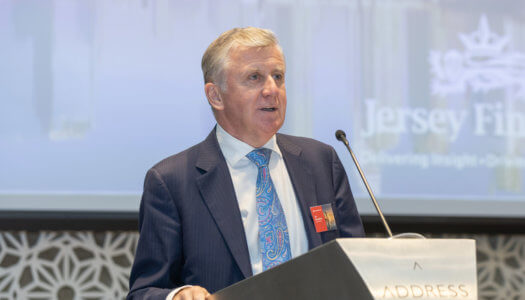Almost two months ago, just before Jersey went into its version of ‘lockdown’, I wrote a blog pointing to just how significant I thought collaboration across the industry would be in tackling the repercussions of the coronavirus pandemic.
I spoke about how our combined potential as a 14,000-strong workforce with broad and deep expertise could be vital in helping to mitigate the impact of what will no doubt be one of our biggest collective challenges, at home and around the world.
With restrictions beginning to be lifted both in Jersey and other countries, including overseas markets where Jersey’s finance industry is active, the cost of the pandemic is becoming clearer. It is devastating and it is long-term. Economies, it is predicted, will take years to recover; businesses and livelihoods will be lost along the way, and unemployment will spike.
The International Monetary Fund, for instance, is forecasting that the global economy will shrink by 3% this year, with around US$9 trillion being knocked off global GDP over the next two years. The Bank of England, meanwhile, has warned that the UK economy will experience its deepest recession on record, with the economy being on course to shrink 14% this year.
Then there is the social cost – the prospect of years of austerity and tax hikes to pay for massive government debts, loss of livelihoods and defaults on loans, will undoubtedly drive negative discourse around issues like inequality, and exacerbate some of the social polarisation and division we were already seeing – around Brexit, and political protectionism for instance.
Closer to home, we’ve seen all this play out too. Much loved local businesses in all sectors are having to completely remodel their operations; some are really struggling. Charities and volunteer groups too, which are so fundamental to our social fabric, will struggle in the face of the inability to fundraise and additional pressures on operations.
At the origins of the pandemic, I outlined how I thought it was our shared responsibility as an industry, and our obligation as good citizens, to work together to support each other and our communities at home and abroad through the pandemic. That role is now absolutely critical.
It’s why as an industry we have been working hard to introduce measures to support those in the local community and internationally who need support.
In particular, figures published by the Government of Jersey show that the total value of loans approved under the government-backed Business Disruption Loan Guarantee Scheme stood at, £754,000 as at 11 May – just a matter of weeks after it had come into play. That’s a pretty impressive turnaround by local banks to approve loans and support local businesses.
We have also been in regular contact with our Members about how they could support local community groups, charities and SMEs, and the response was overwhelming – they are ready and willing to lend their expertise to help local businesses and charities. We have shared these contacts with colleagues at Jersey Business who are matching the skillsets available and the business needs.
We have also promoted requests for assistance, initiatives and updates from some of our key partners, and have been encouraging our Members to find out more about volunteering their time or making financial donations to local charities and the Bailiff Covid Fund. We’re aware of local firms making donations totalling hundreds of thousands of pounds to local and international relief efforts.
At the same time, as an internationally dynamic and resilient international finance centre (IFC) we stand ready to aid the road to recovery beyond our own shores too, to help channel capital to where it is needed most in the world.
Just as we saw in the aftermath of the global financial crisis more than a decade ago, we can anticipate some anti-IFC rhetoric over the coming weeks and months from campaign groups, but I remain convinced that reputable centres like Jersey will be absolutely critical to the global economic and social recovery from the pandemic.
The sort of expertise, governance, robust platforms and solid advice that IFCs like Jersey are renowned for will be increasingly sought after as getting capital from multiple sources securely, rapidly and efficiently to where it is needed most becomes more and more important. The scale and complexity of the impact investment and stimulus being coordinated internationally needs to be targeted, large scale, and secure, however – and this is where Jersey is ready to play a key role.
The fact that around 60 million people worldwide benefit from having their pension funds administered through Jersey, that Jersey helps distribute around US$76 billion in foreign direct investment to global markets annually, and that Jersey is playing host to a growing base of ESG and impact funds each year should only underline the role it can have in meeting global needs over the coming months.
These are challenging times for our local community, and for our global partners, but Jersey’s finance industry has the opportunity now to really demonstrate what it excels at and reflect what it stands for – connecting people and bringing about positive change. In that context, Jersey has both the responsibility and the capability to play a vital part in the road to recovery, at home and internationally.




